By Michael Waldman\Brennan Center
Photos: YouTube Screenshots
Donald Trump’s win in the Iowa Republican caucus did not surprise.

Turnout was desultory, about 40 percent lower than the last time there was a contested GOP race in 2016. Trump’s 56,000 votes would not fill the seats at the local college football stadium. At the same time, the result suggested that the race for the Republican nomination could effectively be over.
All of which suggests a few things for the health of our democracy.
Democracy was not on the ballot
The Republican candidates have treated us to one of the most bizarre tactical and rhetorical battles in presidential primary history. Trump is the only president in history to have been impeached twice, once for flagrantly attempting to overthrow the Constitution, and he’s now under multiple indictments for crimes committed while in office. His two main challengers acknowledge that his 2020 election defeat was legitimate. And yet neither made this the central part of their case against Trump, or even a major talking point.
I get it — polls suggest that Iowa Republicans have little appetite for pushback against Trump. A CNN entrance poll from last night showed that two-thirds of Iowa caucus-goers do not believe Joe Biden was legitimately elected president. And about 60 percent would consider Trump fit to be president even if he were convicted of a crime.

But here’s another take on that data. In a normal primary, trailing candidates hammer away at a front-runner’s vulnerabilities. By refusing to hit Trump where he’s weakest, Nikki Haley and Ron DeSantis gave Trump a free pass to lie about the 2020 election. They didn’t tell Iowans the truth, and they made it too easy for voters to believe the Big Lie. This is a moral failure, but the first round of results shows it to be a strategic failure as well.








